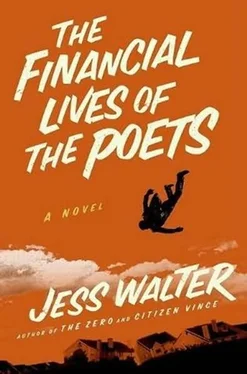weren’t allowed to take sides, and, were I allowed to take sides, it wouldn’t be with a guy who wanted to build cheap houses on a polluted hillside soggy with oil leeching from old buried tanks. “Yeah,” he said, “but you’re fair. I can smell the fair on you.”
In the late 1990s Earl first approached me with the idea of starting his own newspaper. Earl’s newspaper would be “business friendly,” he said, and would contain none of the “liberal bias” and “anti-growth bullshit” that he believed were choking off development and keeping capitalists like himself from making money and filtering it back into the economy through the companies that made yachts, Jacuzzis and Scotch. I always liked Earl though, and we played golf together a few times. But I always thought he was talking out his ass about owning his own publication. Then he began drawing up a business plan, and one day he called to see if I might want to edit his newspaper-which was going to be called, I kid you not, The Can-Do Times. But I still had a job then, so I was brutally honest with him: “Earl, I can’t take the job, and I have to tell you, I don’t think this is the right climate to be starting a newspaper, anyway.” A third-generation Westerner, Earl wasn’t a tie-and-jacket man as much as an ironed golf-shirt and big belt-buckle guy. He just laughed at me. “So I should take bid’ness advice from a guy makin’, what, fifty grand a year?” It was actually nearly sixty, but I didn’t say so. “Look, Earl,” I said, “I know you can read stock listings. Newspapers are just a bad bet right now. You might as well be starting a railroad. Or a Pony Express station.” This was when media stocks were merely trading down a few points, before “buying media stock” became a synonym for setting your money on fire. But this was also around the time that I was thinking of leaving my job to start a business-poetry website, so I maybe wasn’t the best person in the world to lecture Earl on bad ideas.
Over the next year, of course, I went back to the newspaper and quickly lost my job, and Earl’s idea began to seem less crazy.
So last week, I called and asked if he was still moving forward with his newspaper idea. He said he was, and he was glad to hear from me because he hoped to be up and running in a year and he still didn’t have an editor. And as he talked about his paper, it seemed that he’d been doing his research, because he’d given up the idea of a daily print edition of The Can-Do Times. Now, it would strictly be updated online, and he’d only produce one hard copy a week, a slender Sunday night edition-Sunday nights being the cheapest press run in town. This Monday morning howler would feature only the best columns and pieces that had run online all week, and would sit in the offices of people like Richard, my ganja-reefing broker, allowing savvy local businesspersons to feel like they’re hitting the week running. I asked if Earl was worried by the hard economic times and he said that a recession was the best time to go into business, just as it was the best time to buy real estate, because, “trust me, the big-dicks ain’t hidin’ in their panties, Matt,” and when Earl gets going, you don’t stop to untangle the words, you just go with it; No, Earl added, now was the time to “pull the goddamned trigger, open ’er up like a six-buck whore,” whatever that meant.
It wasn’t that Earl’s bluster totally convinced me, and the thought of writing developer propaganda for him wasn’t exactly my idea of a dream job, but if he could at least pay me close to what I was making, say, sixty thousand (I’d gladly take fifty) a year, I owed it to myself and my family to see if Earl and I could make a go of it. And maybe the idea would fail, but it wouldn’t be for my lack of trying; I was prepared to give it the best effort I could muster.
Our meeting is 11:30 lunch at a sushi place, which is not as odd as it sounds for a porterhouse like Earl; as my friend Jamie might say: dude love him some uncooked fish. It’s something to behold, watching Earl in a sushi place. He has a shark-like single-mind
edness, eating roll after gourmet roll, gobbling gobs of sashimi, handfuls of edamame, slabs of seared ahi and maki, full paddies of rice. Every time the waiter passes, Earl orders something else. The last time I saw him, almost ten months ago, we were at this same sushi joint; he killed more fish in two hours than a trawler could in a week.
I walk around the restaurant but don’t see him. The only person here is a thin guy who-
“Matt!” calls this thin guy, sitting at a table near the door. He stands. He looks like Earl at the end of an old televised movie shot in CinemaScope, when they have to squeeze everything into a skinny frame to make the credits fit.
“Earl?” I ask.
He is at least eighty pounds lighter. The suburban sprawl that used to spill over his substantial belt has been zoned out of existence, and standing in front of me is a guy in size 33 Wranglers, craggy, gaunt and gray, like one of those aging Grand Ole Opry stars right before they die of lung cancer.
In fact, my first self-pitying thought is that the angel of my recovery has gone terminal on me-along with my prospects for the future-but he says, “Fuck no, ain’t never felt better.” He had a heart attack, he explains, and his doctor ordered him to lose the weight. “And I don’t do nothin’ half-assed,” he points out, offering me some unsalted edamame. “Doctor says lose eighty pounds, I lose me eighty pounds.” He fixes me with a hard stare. “And what’s the matter with you? You look ten years older.”
I explain that I’m not sleeping well. Or at all.
Another minute of small talk, then Earl says, “Should we get this shit on the table.”
Here is the shit Earl puts on the table: he is prepared, right now, to offer me the job as editor of The Can-Do Times. At first it will just be me, but eventually he wants a staff of six, made up of
three part-time entry-level people, two college interns and possibly one other mid-career person like myself.
“That’ll all be your call,” he says. “I’m gonna stay outta the kitchen. Not that I won’t give you my opinion, but shoot, you can feed glue to a horse an’ it’ll look like he’s doin’ algebra. No, only thing I ask-” and his skinny index finger points at my nose “-is that you give business in this town a fair shake and a voice for once. But this here’s your deal. I ain’ about to piss in the whiskey barrel.”
And suddenly I love Earl. I love his belt buckle and I love that country-lisp-whistle in his voice that cuts the ends off words and makes a word like whiskey sound cool and I love a man who can simply will himself to lose eighty pounds and I love his business sense and I love Can-Do and I love this man’s courage, and his balls (metaphorically) and I especially love this homespun way of his, in fact I vow to start using phrases like piss in the whiskey barrel in conversations. I think I’ll have it burned onto a wooden sign for Earl, the kinds of signs people put at their lake cabins, and I can even imagine-although I’m not stupid enough to bring it up right now-that once we’re off the ground and I’ve introduced the extraordinarily popular feature The Fiscal Poet to The Can-Do Times, I’ll write a sonnet in Earl’s honor, fourteen rhyming lines breaking into four heroic couplets featuring Earl’s own homespun wit, ending with his lyric motto:
…Man who could feed glue to an upright horse
Make it look like the animal’s talkin’
Could throw a fastball a hundred-n-four
Knock down batters even when he’s balkin’
Earl who can eat bone and drink marrow
Ain’t gonna piss in the whiskey barrel.
Читать дальше










